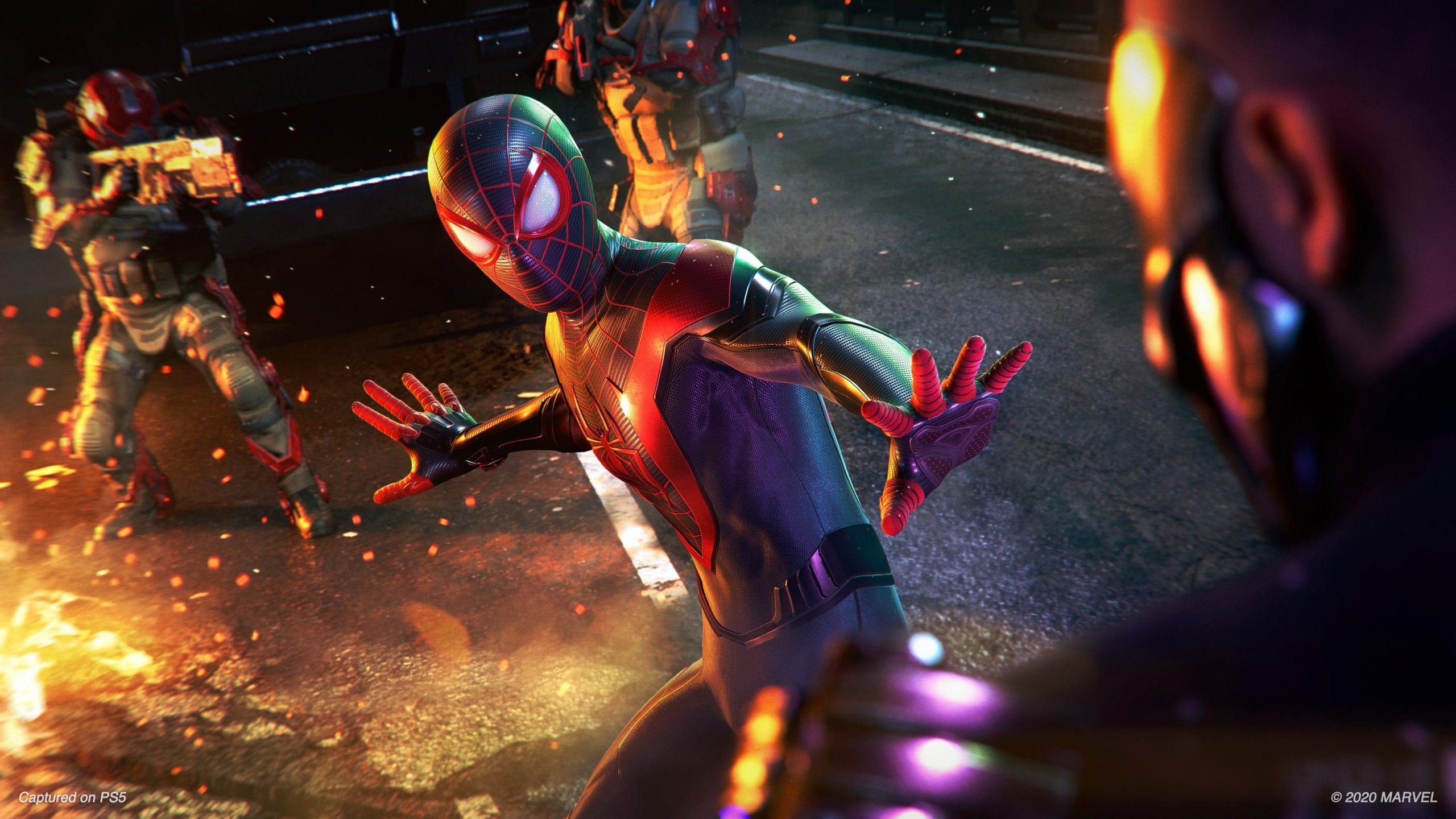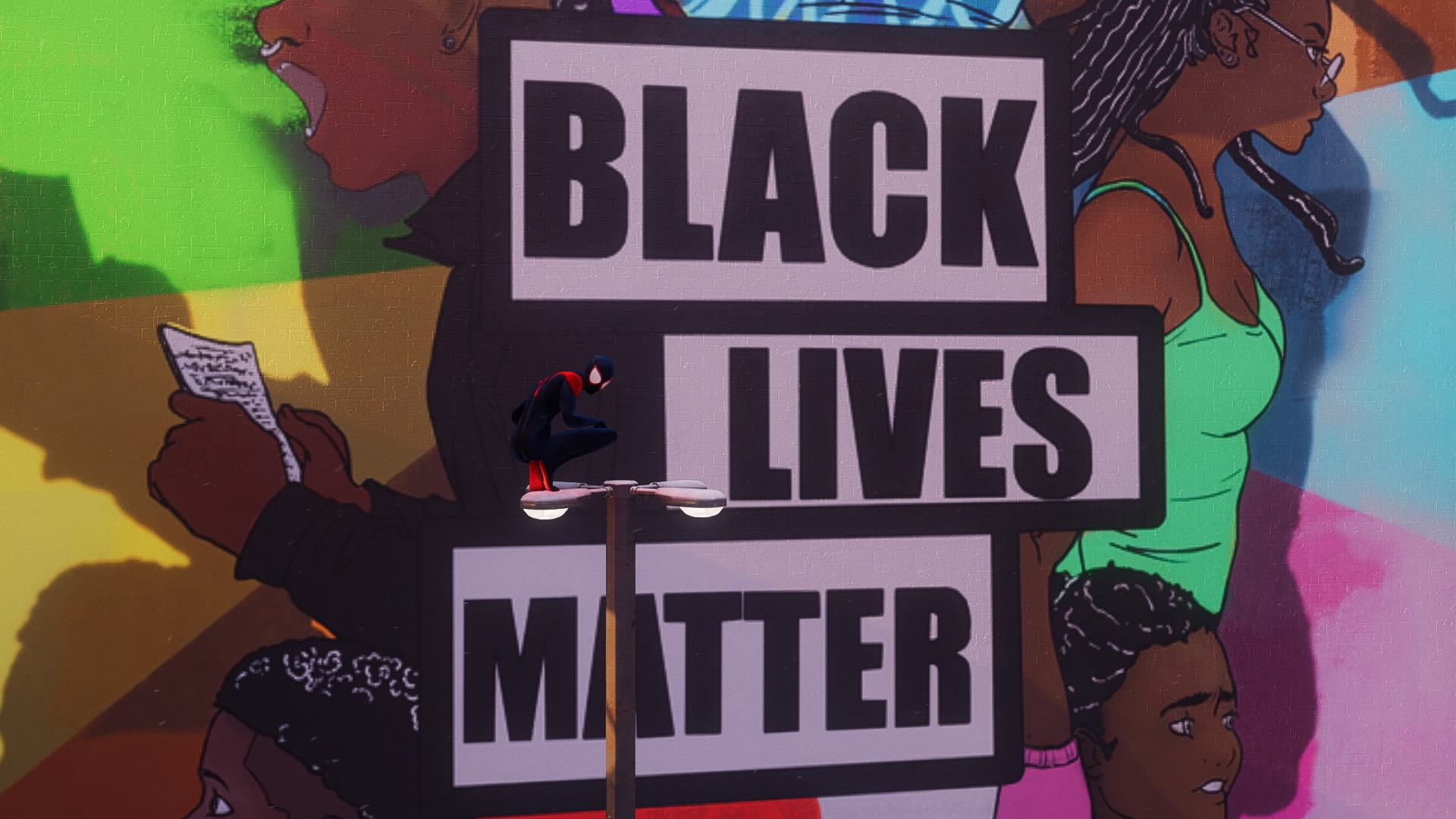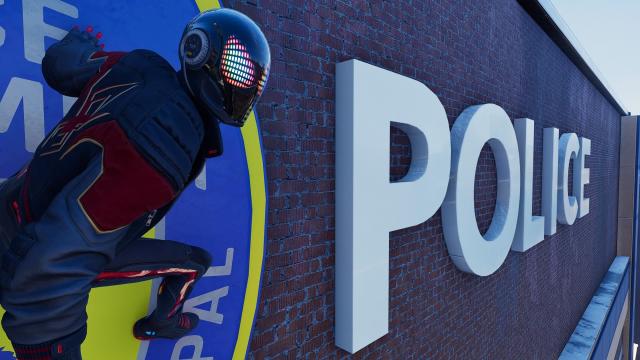Insomniac’s Spider-Man: Miles Morales follows the fledgling webhead as he steps out from under Peter Parker’s shadow. He’s defending New York City on his own for the first time just as a bitter ground war breaks out between the nefarious Roxxon Corporation and the tech-powered Underground movement. New as Miles is to this life, fighting crime is his calling, and he’s ready to step up to the plate.
As the conflict spills out of Harlem into other neighbourhoods, Miles realises that he has to intervene because NYC’s conveniently out of superheroes all of a sudden. Not to mention the NYPD’s deeply unprepared to go to toe with either the Underground or Roxxon’s trigger-happy commandos. By placing its hero at the centre of an ongoing battle between two warring factions, Miles Morales follows in its predecessor’s narrative footsteps and plays into the idea of Spider-Man — regardless of whether it’s Peter or Miles under the mask — always being pulled in different directions.
Where Peter’s game framed the ground-level police as his (at times unwitting) allies, Miles Morales goes out of its way to draw as much attention away from them as possible. It often feels as if the game’s creative team understood that a story about an Afro-Puerto Rican teenager teaming up with New York cops would strike the wrong tone — especially in a year that’s been defined by protests calling for police reform and abolition in response to the kind of institutional police brutality that’s left countless innocent, unarmed Black and brown people murdered by law enforcement. But the more you play the new game, the more you see that its attempt to acknowledge our real-world realities only goes but so far. Ultimately the game either doesn’t have the courage or desire to be honest about the way things are.

In Insomniac’s first Spider-Man game, Peter spends a considerable amount of the core campaign assisting the NYPD in their fight to take down both Wilson Fisk and Martin Li while also dealing with trigger-happy Sable International commandos and escapees from the Raft. Were it not for Peter’s efforts, New York’s cops would be utterly overwhelmed by the superpowered threats facing their city, but Peter, the self-proclaimed “Spider-Cop,” is all too eager to help out the boys in blue. He ultimately sees his vigilantism as an extension of the law and order the police purport to represent.
Even after you beat the first Spider-Man’s core campaign, as you play through the postgame searching for all the holdouts from Li’s Inner Demon gang who continue the organisation’s operations even though their leader’s been imprisoned, Peter uses messages intercepted from a police scanner to keep abreast of crimes. The NYPD might not exactly know that Spider-Man’s working with them to rid the city of evil, but the game makes it impossible to misunderstand that Peter sees the police as an invaluable tool in his web-slinging arsenal.
Very early into Miles Morales, after Peter’s left New York to tag along with Mary Jane on a reporting trip, Miles comes face to face with both Roxxon and the Underground. The two gangs square off on the High Bridge, and panicked civilians desperately try to escape the collapsing structure. As Miles webs his way around the crumbling structure, taking out armed goons and scooping up imperiled people before they plunge to their deaths, it becomes clear that Roxxon and the Underground are willing to bring the city to ruin in order to accomplish their goals.

The game’s opening act features a moment in which Miles, with his hands up, stands between a Roxxon soldier and an armed member of the Underground. The entire scene evokes the image of civilians imploring deadly authority figures to lower their weapons rather than immediately leading with violence. The game attempts to equate Roxxon and the Underground’s methods with the type of brazen brutality that’s cultivated within American police forces, but on top of that, the story asserts that both groups are the ultimate enemy of the good.
Like Peter, Miles comes to use technology to guide him in his crime-fighting exploits, but unlike Peter, rather than piggybacking on the police’s infrastructure, he instead relies on Ganke Lee’s Friendly Neighbourhood Spider App. It’s something people across the city already use to report suspicious activity they witness and is essentially a riff on Nextdoor, a platform that’s been plagued by issues concerning racial profiling. Use of the tech represents Miles’ growing connection to Harlem and the game’s attempt at imagining a world where policing’s fundamentally driven by the community itself rather than the police. Behind that attempt, though, you can plainly see Insomniac’s desire to distance itself from the overt optics of Spider-Man using police tech to help them, but the game never makes any attempt at acknowledging why those optics are bad.
[referenced id=”1511577″ url=”https://gizmodo.com.au/2020/09/miles-morales-is-about-to-make-you-want-to-protect-harlem/” thumb=”https://gizmodo.com.au/wp-content/uploads/2020/09/25/zalhwcm4wphqtqvjqbpg-300×169.png” title=”Miles Morales Is About to Make You Want to Protect Harlem” excerpt=”Miles Morales: Spider-Man is set to bring all sorts of new characters and next-gen gaming elements to Insomniac’s Spider-Man franchise in a way that makes Miles’ early days as a hero feel distinct from Peter Parker’s path in the previous game. But the thing about Miles Morales that’s likely to…”]
Cops are very much a part of Miles Morales’ world, even beyond his late father Jefferson, an officer who died in the line of duty during the events of the first game. You don’t have to look particularly hard to spot them patrolling the streets or popping up in action-packed cutscenes where it’s obvious they’re out of their depth. The police are there on the sidelines as this all-new, all-different Spider-Man single-handedly rallies to save the city from destruction. This time though, they’re presented as an inert, mostly unengaged presence that interacts with reality far less than the game’s NPCs.
Miles Morales’ world isn’t meant to be a direct reflection of our world and the societal ills that plague it, but at the same time, you can hear and see the writing team trying to acknowledge ideas and conversations about social justice. That comes out in elements like Danika Hart’s podcast which periodically cuts in while you swing through Manhattan. The problem is that while characters like Danika pay lip service to the ideas of resisting authoritarian rule and rallying against megacorporations — ideas that, again, resonate in this particular moment — Miles Morales aims little to none of that energy at the police themselves. This makes the story feel decidedly out of touch, especially in moments when the game alludes to Harlem being targeted specifically by Roxxon’s dangerous new energy source because of its Black, brown, and working-class population.
At the same time that the story eschews making petty drug busts in favour of stopping arms dealers from selling guns in Central Park, it largely sidesteps making mention of how the police historically existed as organisations harbouring the very same kind of domestic terrorists Miles Morales wants you to take down with well-timed venom blasts. To Miles Morales’ credit, it does feature a prominent Black Lives Matter Mural down in the Financial District, as well as an unlockable black and yellow Uptown Pride costume. But the Uptown Pride suit’s locked behind side quests that aren’t integral to the game’s main plot, and there’s something about Miles donning the suit without the game directly engaging with the ideas BLM stands for that makes the gesture feel somewhat hollow.

Miles is the Black, Latinx son of a slain cop and an aspiring local politician whose entire campaign revolved around making Harlem a stronger, safer community for its residents, despite the lack of support and resources it’s historically been afforded. Miles is also a justice-minded vigilante who knows that he can do what the cops can’t and won’t. Everything about who Miles is as a hero makes it difficult to sit with the idea that he wouldn’t have a more complicated and at times negative relationship with the police than Peter does, owing to their vastly different cultural experiences.
With Miles Morales, Insomniac’s crafted a more-than-solid first outing for New York’s newest Spider-Man that makes the prospect of future games an interesting one. But if the game studio really wants its next-generation take on New York City’s finest web-slingers to feel like dynamic, engaged people at the centre of stories worth diving into, it’s going have to do a better job of addressing the way things actually are rather than how we want them to be.
